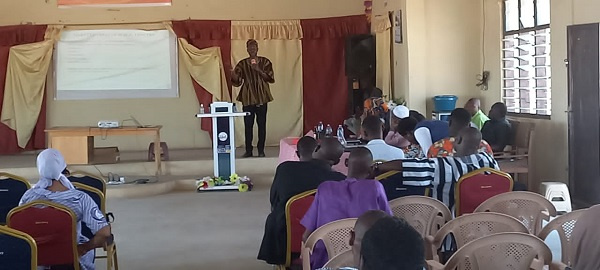The lack of health structures at the Sissalla West District of the Upper West Region is impeding access to health delivery, Dr. Mathias Tengan, the District Director of Health, has said.
There are 42 functional CHPS compounds but 20 of them currently function without physical structures.
Dr. Mathias expressed the concern in Gwollu during the annual performance review of the Ghana Health Service, on the theme: “Implementing the health-in-all policy: A means to attaining sustainable and quality health service delivery in Sissala West District”.
He said the provision of such infrastructure for those zones would ensure effective service delivery.
The district, with a population of 65,296, has one hospital, six health centers, and 42 functional CHPS zones, 20 of which currently function without physical structures, which were supposed to provide critical health services to the people from the remotest part of the country.
However, the district made remarkable improvements in CHPS functionality from 32 to 42, improvements in TB case detection from eight in 2021 to 17 in 2022.
Others include stillbirth and neonatal mortality, which saw a decline from 2.6 percent in 2021 to 1.4 percent in 2022, and 2.6 percent in 2021 to 0.69 percent in 2022, respectively.
The adolescent pregnancy rate also saw a reduction from four percent in 2021 to zero in 2022. There was zero maternal mortality, while the under-five mortality rate reduced from 4.6 percent in 2021 to 3.4 percent in 2022.
Dr. Tengan said the excellent surveillance system led to the early suspicions of 18 AFP, 135 measles, 52 yellow fever, and 17 confirmed TB cases, which were dealt with.
He said though anemia was still a menace in the district, there was an improvement in hemoglobin checked at registration and at 36 weeks of gestation.
“We were also fortunate when we hosted the Ghana Health Service National Council in the district, which led to some pertinent issues confronting healthcare delivery receiving attention,” he said.
Dr. Tengan mentioned inadequate accommodation for health staff overcrowding at the District Health Directorate, lack of means of transport, inadequate delivery beds, and staff refusal to accept postings to the district as some of the challenges.
“The lack of electricity and water in newly constructed health centers and CHPS compounds at Zini and Jeffisi are working against the staff in those communities,” he said and appealed to all stakeholders to support in addressing those challenges.
Madam Ayisha Batong Hor, the District Chief Executive, gave the assurance that the District Assembly had prioritized effective healthcare and would do everything possible to reduce the challenges in the sector.
Source: gna.org.gh




